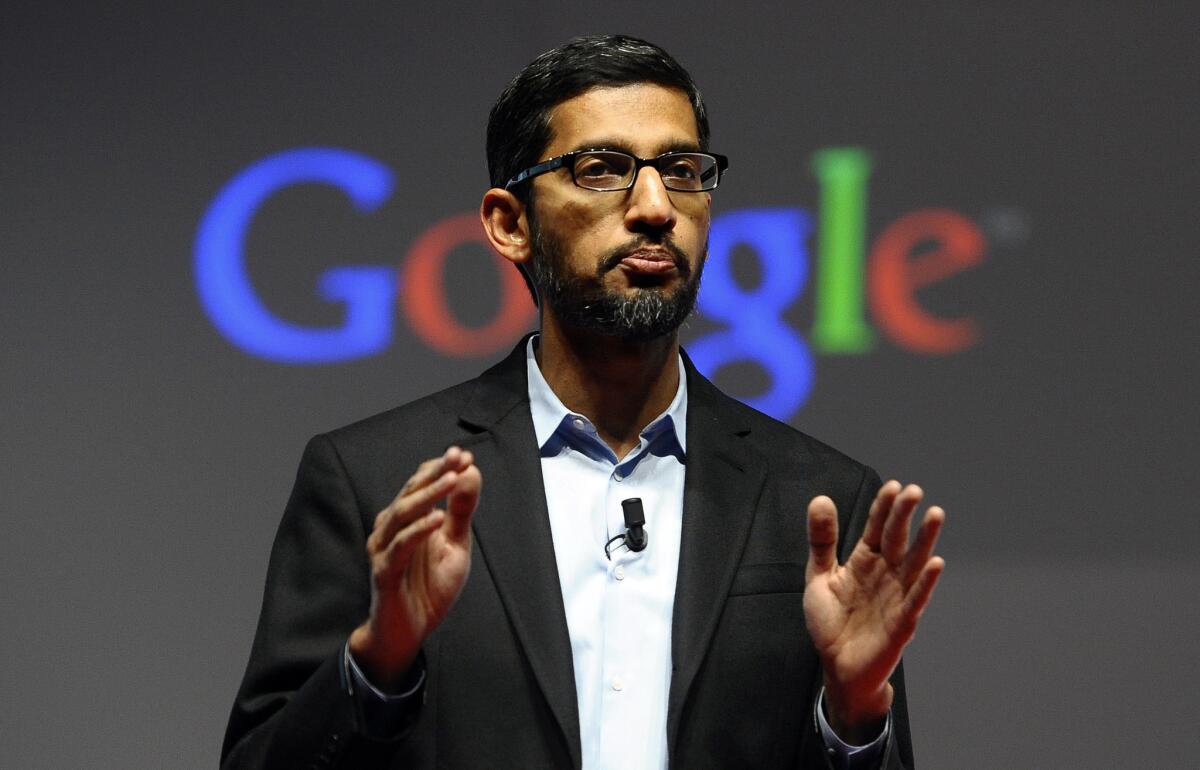Google’s Sundar Pichai becomes Alphabet CEO; Larry Page and Sergey Brin step down

- Share via
Google Chief Executive Sundar Pichai will take over the top job at the search giant’s parent company, Alphabet Inc., as co-founders Larry Page and Sergey Brin step away from their roles as CEO and president, respectively.
Page and Brin, who founded Google in 1998, will continue to serve as Alphabet “board members, shareholders and co-founders,” they wrote in a company blog post Tuesday. They continue to control the majority of voting shares in Alphabet.
Pichai’s ascendancy to Alphabet CEO was not a complete surprise, as Page and Brin have been inching away from public-facing roles and were no longer involved in daily operations.
“We’ve never been ones to hold on to management roles when we think there’s a better way to run the company,” the founders said.
The decision comes amid rising profits at Alphabet. Since Page and Brin established Alphabet in 2015 and appointed Pichai the CEO of Google, the parent company has recorded 15 profitable quarters. Its stock has climbed more than 80% since the parent company was formed. Last year, Google reported $136 billion in revenue, up from $110 billion the year before.
Despite this financial success, Alphabet and other large technology companies now face increased scrutiny over privacy concerns, hate speech and disinformation.
Pichai has managed this scrutiny, testifying before Congress last December to answer questions about data privacy and Google’s purported political bias in search results against conservatives, which he denied.
Such pressure is likely to continue, particularly heading into the 2020 election year, and it might be a reason Page and Brin are choosing to further distance themselves from day-to-day operations, analysts said.
In the years since Google cemented its slot as the dominant player in search, the co-founders have at times opted to stay out of the public eye and focus on projects that particularly interest them. Page has recently spent time on a company called Kitty Hawk, which is trying to build flying cars. Brin has focused on promoting Google’s more creative initiatives, including Google Glass.
“The regulatory head wind is hitting everyone — no one is immune,” said Brent Thill, managing director of technology at financial services firm Jefferies. “As long as they are doing the right thing for consumers and making their life better and not taking advantage of some loophole ... they’re going to be fine.”
This isn’t the first time Page and Brin have stepped aside. Eric Schmidt took over as Google CEO from Page in 2001, a few years before the company’s initial public offering, and kept the job for a decade. Page resumed the Google CEO role in 2011 until Pichai’s appointment in 2015.
Page and Brin retain power in a different way: through their holdings of Alphabet stock. Their shares give them a combined 51.3% of votes, so if they join forces they can unseat a CEO who dissatisfies them.
Pichai has had a meteoric rise since joining Google in 2004. He helped to spur development of Google Toolbar and later, Google Chrome. In 2014, he was tapped to lead product and engineering for all of Google’s products and platforms, including Gmail and Android. The next year, he was leading the company. He joined Alphabet’s board of directors in 2017.
As Alphabet CEO, his portfolio will expand beyond Google’s core products to include initiatives such as the self-driving car subsidiary, Waymo.
“I’m excited about Alphabet and its long-term focus on tackling big challenges through technology,” Pichai said in a statement. “I’m looking forward to continuing to work with Larry and Sergey in our new roles. Thanks to them, we have a timeless mission, enduring values and a culture of collaboration and exploration. It’s a strong foundation on which we will continue to build.”
Analysts said they didn’t expect much to change under Pichai’s leadership at Alphabet. After all, the company has seen growth in its other bets, such as Waymo.
“It’s not like Larry’s leaving the keys at a time when the company is in flux,” said Dan Ives, managing director at Wedbush Securities.
Investors reacted similarly to the news — shares of Alphabet were up 0.6% in after-hours trading on Wall Street.
“It’s just a natural evolution,” Thill said. “When you’ve had a two-decade run where they’ve had incredible success ... there’s a lot of other things in life to pursue.”








